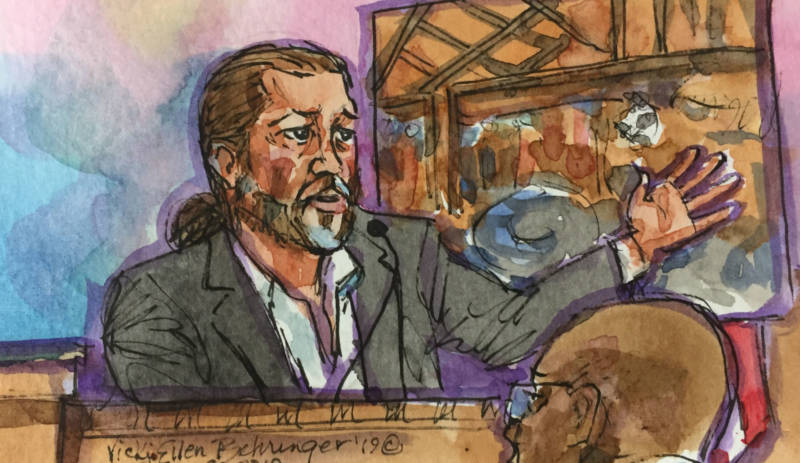On Wednesday, Almena again reiterated Kai Ng's "policy" after Ng had walked through the warehouse and seen kitchens and rooms.
"You guys are really living here. Don’t tell the cops," Almena said Ng told him.
'No Permits for Anything'
James questioned Almena about whether Eva Ng had requested he go over plans and provide copies of permits regarding the installation of a side door to the warehouse. Almena responded that no permits for the door existed.
Almena testified he also did not obtain permits for a set of stairs built in the front of the warehouse and for additional electrical and plumbing work.
Asked if he had acquired the proper permit to install a kitchen, Almena said there were "no permits for anything." He also said he didn’t obtain operational permits for events because he didn’t think they were required.
James asked about the types of safety measures installed at the Ghost Ship. Almena said there was no sprinkler system and no internal or external fire alarms. He said there were no smoke detectors in the stairwells or in the upper level dance area or lower level common areas. He said detectors were in his kids' areas, in the kitchen and elsewhere. He said there was an illuminated exit toward the front of the building, but that it only worked if the switch was on.
'Debaucherous Parties'
James also questioned Almena about testimony he gave Tuesday in which he said raves and "debaucherous" parties weren’t allowed at the warehouse.
James focused on a 2014 New Year’s party where police were called when things became “physical” between the organizers of the event. Almena said he did not plan the party and "hid most of the time."
James asked Almena about statements he made in a Jan. 3, 2015, police report and whether he had told a police officer that condoms were left all over the floor the night of the party and that his son had put one in his mouth.
Almena responded that his son had touched a condom but did not put it in his mouth. His reply prompted James to play body camera footage from the night of the police report, in an effort to challenge Almena's court testimony.
The defense objected, saying the audio was “inaudible,” and Serra said the prosecution was engaging in “character assassination” and that the video should not be admissible as evidence.
Alameda County Judge Trina Thompson excused the jury for the remainder of the afternoon session in order to play the full video for the "purpose of refreshing the recollection of Mr. Almena" and to hear objections from the defense.
James argued that the video was not character assassination. "It’s about his credibility,” he said. “If any witness says something directly contrary to their previous statement, they can be confronted.”
Curtis Briggs, who represents Max Harris, argued that the video should be "unambiguous" regarding its content.
In the video, the officer writing the police report repeated aloud Almena's statements, which included describing that his son had put a condom in his mouth. After viewing the entire video, Judge Thompson sided with the prosecution in allowing it as evidence.
“Based on totality (of the video), the court finds proper impeachment,” Thompson said.
The prosecution is expected to continue cross-examination of Almena Thursday.

